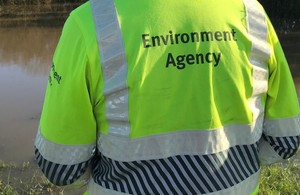Environmental inequality must not be ignored
Sir James Bevan discusses need to address environmental inequalities as part of the "levelling up" agenda

Tackling the stark inequalities in exposure to pollution, climate shocks and access to green and blue space in cities should form an integral part of the “levelling up” agenda, Environment Agency Chief Executive Sir James Bevan will urge the government today (Tuesday 20 July).
Speaking at the launch of the Environment Agency’s State of the Urban Environment report, hosted by Global Action Plan, Sir James will highlight how poorer communities have higher exposure to air pollution, flood risk and poor water quality in rivers.
Highlighting the environmental inequalities that remain hidden and overlooked within our cities, he is expected to say:
The inequalities in this country are not just economic. Levelling up the environment so that it is better for everyone is as important as levelling up the economic opportunities.
The 59% of the highest earning households in this country are within a 10-minute walk of an accessible, natural green space compared with just 35% of those in the lowest-earning households. There are also racial disparities: city communities with 40% or more residents from minority ethnic backgrounds have access to 11 times fewer green spaces locally than those comprising mainly white residents.
Investing in a better environment, whether that’s a park, a flood defence or a clean river, will create jobs and growth. Since the worst environments tend to be in the poorest places, tackling them is a double win it will make poorer communities both greener and richer. And because of the link between your environment and your health, environmental inequalities contribute to associated inequalities in health and wellbeing too.
Sir James will say that the government is right to be focusing on levelling up, but that more needs to be done to “clean up, green up and level up”, building on work the Environment Agency is doing with partners to improve air quality, stop pollution, and create more opportunities for the people to connect with nature.
To ‘clean up’ we need to continue the fight against pollution, especially in the face of new pollutants and new pressures of population growth and the climate emergency; to ‘green up’ we need local authorities, developers and city planners to create a fairer proportion of green and blue spaces in cities - this could include creating local parks, improving urban waterways, planting trees around buildings, reducing flooding and providing other pockets of nature for people to enjoy; and to ‘level up’ we need to understand the importance of environment inequalities in tackling social injustices. This means paying better attention to fixing environmental problems where poorer urban communities live – because those problems tend to be worse and more harmful.
This would also help the nation’s economy and health, with the NHS potentially saving over £2.1 billion in treatment costs each year if everyone in England had equal access to good quality green space.
Sir James will also argue that the impact of our changing climate will only serve to widen the inequalities gap in future:
That harm and inequality is being exacerbated by the climate emergency as it brings more extreme weather, more damage to the environment and to people’s health. We know climate change does most damage to the most vulnerable in developing countries – because they have the least capacity to adapt to its consequences. We also know they are also the people who bear least responsibility for causing the problem in the first place.
A similar injustice is happening here. Deprived communities who have smaller carbon footprints and pollute less than wealthier communities often live in areas of higher pollution which are less resilient to the effects of climate change.
The Environment Agency is involved in various projects, alongside organisations such as Natural England, to clean up and green up our spaces. These include working with Thames Tideway Tunnel – London’s new 25km ‘super sewer’ tunnel – to clean up London’s water, restoring and providing better access to part of the River Medlock in Greater Manchester, and advising on the nature benefits around the new OxCam Arc development.
Sir James will be speaking at an event co-hosted by the Environment Agency and Global Action Plan, a charity that is working to build cleaner, greener and fairer cities.
Sonja Graham, CEO at Global Action Plan, said:
This report highlights starkly how social and racial injustices sit alongside the environmental crisis, and how we must address them together. We see this play out every day through our work on air pollution with schools, hospitals and communities – the worst pollution impacting those with the least resources to protect themselves and usually least responsibility for creating it.
We are pleased to launch this new evidence with the Environment Agency and hope it is a catalyst for urgent cross-sector discussion and action to build cleaner, greener and fairer cities.